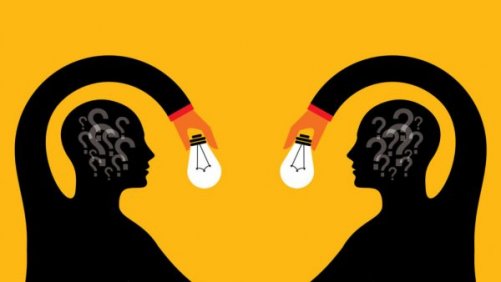Five Albert Bandura Quotes on Social Learning

Albert Bandura is a Canadian psychologist. He currently works as a professor at Stanford University. His research publications, that take on a cognitive-behavioral slant, have gained recognition the world over. He’s mostly famous for his social learning theory. Today, we’re going to gather up some of his most famous quotes. Through them, we intend to understand how he views society.
Among Albert Bandura’s most important works, his social learning theory is one of the most famous. However, people also know him for his Social Learning Theory of Aggression. Aside from that, he has many others. Reflexive empathy and Self-Efficacy: The Exercise of Control are other interesting works by this psychologist. All of these focus on society and learning.
1. Beliefs can condition you
“People’s beliefs about their abilities have a profound effect on those abilities.”
This quote talks about the power that beliefs have on you. Let’s say that you think you’re no good at math, for example. No matter how much effort you put into it, your ability to solve math problems is going to be impacted negatively by this belief.

On many occasions, however, your beliefs about what you can do well or badly come from your surroundings. This means that someone from your family, for example, may have told you something to influence you. They might have said that you’re very bad at math. Thus, you came to believe that and labeled yourself as such. That decision might have been a defense mechanism against others. The good thing is that you can remove such labels.
2. Psychology is supposed to help, not demand
“Psychology cannot tell people how they ought to live their lives. It can however, provide them with the means for effecting personal and social change.”
When Bandura developed his social learning theory, he came to discover the importance of the work of psychologists. They don’t actually tell their patients what to do, he argued. Rather, they guide people who need support at that point in their lives. This can help people solve their own problems.
Psychologists offer tools and guide people through exercises. This allows their patients to undertake changes on their own that they think will make them feel better. However, these professionals can never say “You have to do this or that” to those who come to them for help. Each one has to make their own life.
3. Learning is bidirectional, according to Albert Bandura
“Learning is bidirectional. We learn from the environment, and the environment learns and is modified thanks to our actions.”
This is our third quote from Albert Bandura. It leaves us with a very profound idea of learning. According to this author, you learn from the environment. You also learn what school teaches you, what you see at home, and what your loved ones try to teach you. But once you have certain knowledge, your surroundings can learn from your actions.
Actions are extremely powerful. That’s because they allow you to change. If someone in your surroundings has manipulated you from a young age and you’ve learned this is normal, you can change it if you act differently. As soon as you stop letting others manipulate you, that manipulative environmental changes.
4. The trap of dependence
“Accomplishment is socially judged by ill defined criteria so that one has to rely on others to find out how one is doing.”
Perhaps many of us identify with this Albert Bandura quote. How many times have you asked others for their opinion because you wanted to know whether what you were doing was OK? Even if you knew whether or not it was, just to get someone to verify it? You can ask others for their opinions, sure. However, you should never depend on them to tell you what to do.
You can find the reason for this phenomenon in judgment. In this case, Bandura’s quote tells you about achievements and valuing them from other people’s perspective. This is a huge mistake. Each one sees their achievements differently. In fact, you can come to devalue your own if you look at them from the point of view of others.
5. Albert Bandura believed a lack of belief in yourself leads to failure
“Self-belief does not necessarily ensure success, but self-disbelief assuredly spawns failure.”
Our final Albert Bandura quote of the day deals with failure. Its source, Bandura argues, lies in self-disbelief. But this is only the perception that you may have of yourself due to what we mentioned at the beginning of this article about the effects of the beliefs of others on you.
A teacher who doesn’t motivate their students can make young people see themselves as incompetent. The young person might also lose the motivation to put the effort into their projects. This can also happen if their parents are unavailable or indifferent to their activities. Bandura wrote a book called Self-Efficacy in Changing Societies. In this work, he dealt with this concept from an academic standpoint. He also included professional, family, and cultural viewpoints, among others.

All of these quotes are great for thinking about today’s society. They might also lead you to consider the nature of what you learn. What aren’t you questioning? And what’s stopping you from shedding all of the beliefs you’re dragging around? You can question what you learn. You don’t have to act according to judgments other people make about you. If you just act based on other people’s opinions, it’ll only make you feel hopeless.
This text is provided for informational purposes only and does not replace consultation with a professional. If in doubt, consult your specialist.








